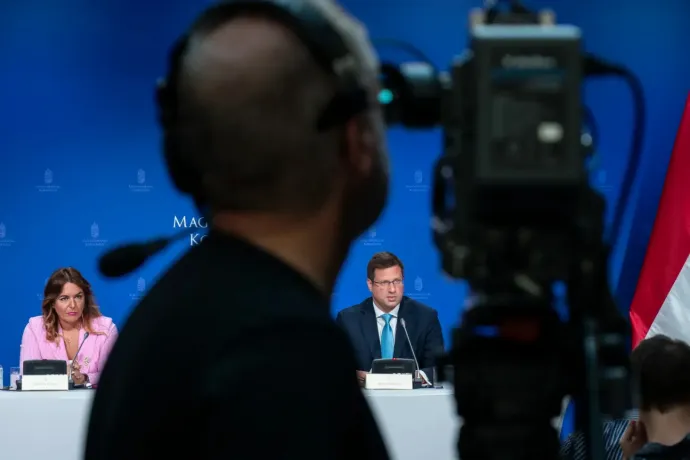
The government has adopted an "anti-war action plan", parts of which will concern the media. This was announced by Gergely Gulyás, Minister of the Prime Minister's Office, at Monday's government briefing.
The minister did not reveal many details, claiming that he was unable to do so because they are still to be drawn up by the justice minister. We have summarized below all that can be known about the proposal so far:
- The government says it wants to combat pro-war propaganda and will for this reason require parties and media outlets to disclose the sources of their funding.
- The minister said that the law only allows the media to receive funds from abroad and "Hungary reserves the right to return funds from abroad that are serving war propaganda to the sender," he said.
- What the minister did reveal was that they were not looking at money from EU countries, but from outside the EU.
- According to Gulyás, there is already EU legislation pertaining to this issue, but he said the government was in favour of a slightly more rule-of-law-based solution, because the EU's is too harsh and radical. The EU regulation applies to Russian media, and has banned media outlets that are carrying out hybrid activities in Europe. According to Gulyás, such a strong regulation is more of a deterrent, and they have no intention of banning newspapers. He did not give a clear answer as to whether there are Hungarian media outlets engaging in hybrid activities.
- The minister said that freedom of the press means that press workers can say what they want, ask what they want, and he said that the plan will have no bearing on that. Gulyás said that editorial freedom would continue to be guaranteed, but that the financial background should not be kept secret.
- He also said no legal proceedings will be brought against anyone, the only expectation is that all newspaper financing should be transparent. This is also the objective of the Office for the Protection of Sovereignty, he said.
- He said that while foreign donations should be disclosed, this does not mean that receiving funding from abroad will not be possible.
- The details will be announced by Justice Minister Bence Tuzson, and Gulyás said that this would be discussed at the cabinet meeting in early September at the latest.
Telex also added to the pro-war list of the Sovereignty Protection Office
In its media analysis a few days ago, the Sovereignty Protection Office concluded that there are two narratives surrounding the Russian-Ukrainian war in the Hungarian media: "the one voiced by Western pro-war forces" and "the Russian state narrative". In its analysis, the agency also identifies who is spreading each narrative.
The analysis examined several independent media outlets, including Telex, 444, HVG and RTL. The articles that are deemed as in line with the "Western pro-war" narrative are listed over seven pages. A significant number of them are opinion pieces, reports from the war, presentations of poll results or interviews. The Russian narrative, according to the analysis, is almost exclusively spread by Magyar Jelen (The Hungarian Present) and Orosz Hírek (Russian News), but only two pages of examples of this were found.
According to the SPO, the two narratives are similar in that they both want Hungarians to believe that escalation and victory for one of the warring sides would be good for Hungary.
The analysis states that those spreading the Western narrative are suggesting to Hungarians that weapons and soldiers should be sent, and that there is no threat of a global war.
The pro-Russian narrative was only found to appear in media products with a low reach, which are spreading the message that there's a genocide being committed against the Russian minority in Ukraine, that Ukrainians are Nazis, and that Ukraine is developing biological weapons and Russia is only fighting a defensive war.
It is not clear from the outlined methodology how the press products to be examined were chosen, so it is not known why for example Origo, which is constantly scaring its readers with an imminent world war, or the public media, or the papers under the umbrella of KESMA were not included. This is a particularly interesting question given that they regularly quote Russian propaganda sites. We asked Gergely Gulyás at the government briefing whether he thought these newspapers were part of the anti-war or pro-war narrative, but he only said that "it would be a big mistake if I were to start analyzing press products".
The Sovereignty Protection Act was passed by the Hungarian Parliament at the end of last year and has since prompted EU infringement proceedings against Hungary. The law formally established the Sovereignty Protection Office, and its head, Tamás Lánczi, was appointed in January by the then President Katalin Novák. Lánczi used to be the editor-in-chief of Figyelő when it published a so-called "Soros list" of randomly selected civic activists, politicians, journalists and campaigners. More on the Sovereignty Protection Office may be found here.
When the idea of creating the SPO was first introduced, the government promised that it was not being set up to target the independent press, the only goal being to investigate foreign-funded organizations. In contrast to this, one of their first steps was to launch an investigation into the investigative journalism nonprofit Átlátszó.
For more quick, accurate and impartial news from and about Hungary, subscribe to the Telex English newsletter!